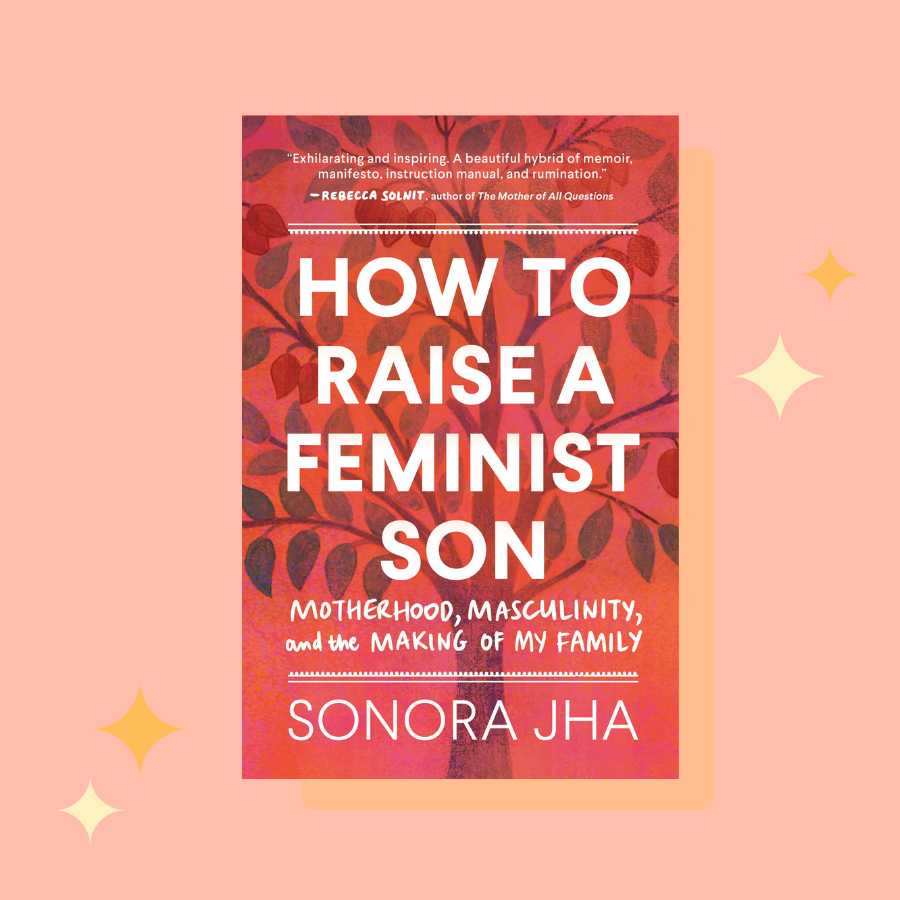Book Review
Sonora Jha’s latest book, How to Raise a Feminist Son, is one that everyone must read. Full stop. Strong statement to make at the beginning of a piece, I know. But hear me out.
This is THE book on raising more compassionate and loving children, and on changing the world.
A quick disclaimer: you need not be a parent to read and enjoy this book. This book is for anyone who interacts with children in any way, but especially for those who take part in the raising of a child. I think that anyone interested in feminism would find this book to be important.
Part memoir, part manifesto, How to Raise a Feminist Son is a confluence of the author’s life, her rich inner life, family life, and feminism. Jha deftly marries theory and practice in between stories and experiences that will knock the breath out of you. With discussions on media, race, sexuality, sexism, racism, and everything in between, the author leaves almost nothing uninspected. She writes through a trained feminst lens, and her love and empathy for her son and others is felt on the page.
At the end of every chapter, there are action items and thought-provoking questions for readers to reflect on. I highly recommend journaling through these items while reading, while the information is fresh. If you can, I also encourage you to listen to the audiobook; the author narrates and the experience is like learning from a friend, over coffee.
At the end of the book, Jha included a resource section where she curated cultural products for children and adults, including books to read and films to watch. Media that challenges traditional gender roles and stereotypes, that encourages critical thinking, and that pushes the feminist agenda forward is included to enjoy with the children in our lives. Books that can help us as adults to keep learning are recommended. This is most definitely an invaluable section that I will keep referring to!
[CW: book contains brief mention of sexual assault]
Meet the Author

Sonora Jha is an essayist, novelist, researcher and journalism professor at Seattle University. Her career as a writer spans over years, genres, and places, including India, Singapore and the United States. She was gracious enough to answer our questions.
Nina Avila-Garcia: How was the process of writing this book different from writing your other works?
Sonora Jha: Unlike my first novel, which was literary fiction, or my journalistic and academic articles and books, How to Raise a Feminist Son needed me to be terrifying personal. I have written political essays before which had some personal narratives in them, but with this book, I plunged deep into the gorgeous vulnerabilities that make for good memoir. I was also able to greedily bring in my other passions – journalism and research. I did interviews and I quoted feminist scholarship. I wove these in with my own personal stories, which was very satisfying to all the writing roles I have in my life. But the most unique part of the process, for me, was discovering how much of a joyful feminist life I have lived. It was as if I was discovering it as I wrote page upon page, and I started to get excited about the whole big picture, the fact that this wasn’t just a “how to” book on parenting but a “how to” book toward living with a fierce joy.
NAG: While reading, the connection between your intersecting identities and your decision-making as a parent became more and more clear. How can people with intersecting, and often marginalized, identities use their experiences to help propel the “Feminist Boy Project” forward, beyond the home?
SJ: This is such an important question. Intersectional feminism has to be the only feminist way forward. In particular, BIPOC feminists across genders can see more clearly how white male supremacy operates in the world. They can name it and expose it to those who may not see. Similarly, feminists with disabilities can speak to how ableism empowers masculinist “strength” to be a dominant and unjustly desirable thing. Those of us on the margins can speak about and expose how white male supremacy and capitalism collaborate to create a hierarchy and a pecking order in which even white women haven’t been able to get their slice of the pie, thanks to the glass ceiling. So, the first step is to share more stories. To expose the structures, we can talk to school officials and other parents about bringing in speakers, bringing in the language and the learning of intersectional feminist solidarity into schools, into the workplace, etc. We can build groups of like-minded friends for our kids, or parent groups at school. One an everyday basis, we can simply talk to our boys and get them to tap into their experiences of being “othered” or marginalized, and get them to build empathy with those who have been marginalized in other ways. Conversations drawn from intersectional feminism will enable a white boy from a lower income family, for instance, to tap into the empathy he needs in order to understand the marginalization of a Black girl in his classroom, so he may perhaps not recreate or may even actually dismantle the structures that keep us all behind. We have to talk about these things everywhere. Everywhere.
NAG: What are your thoughts on the future of feminism? What should we change about it, and why?
SJ: Oh, I am so excited about the future of feminism. I see my students living feminist lives. Cis-gender, heterosexual white boys are openly talking about their privilege these days. A young white man on the student paper I advise investigated a story on sexual assault with such humility and compassion. Young women of color are calling out racism and misogyny. Look at that all-girl Asian American and Latinx punk rock band – The Linda Lindas – who just got a record deal based on their song Racist Sexist Boy! All these young intersectional feminists are urging Trans-Exclusionary Radical Feminists (TERFs) to stop thinking of gender as a binary and get on board with a more expansive, inclusive feminism. As the mother of a brown-skinned son in America, I am excited that feminism is making the world a safer place for him.
NAG: How can readers support your work?
SJ: Buy my book, enjoy it for memoir or manifesto or manual, gift it to others, talk about it, post on social media, write a review or rating on Amazon/Goodreads (even if you bought the book through an independent bookstore, which you should), get your book-club to read it, get your bookstore to buy it. Oh, and don’t forget to smash the patriarchy and live a feminist life.
NAG: We are very bookish (and curious) over at Feminist Book Club, so we must ask: what are you currently reading?
SJ: I am reading this beautiful book called World of Wonders: In Praise of Fireflies, Whale Sharks, and Other Astonishments, by Aimee Nezhukumathatil. She weaves personal essays with luscious stories about things found in nature. And someone gave me an advance copy of Animal, a forthcoming novel by Lisa Taddeo, about raw, female rage, which I cannot wait to read next.
NAG: If there is anything more that you’d like to touch on or add, please feel free. Thank you for taking the time to answer these!
SJ: I’d love to add that I have been taken by surprise by the kind of readership the book is getting. Mothers and fathers, yes, but also young men and middle-aged men who simply want to do better – be better partners and friends. And young women such as one who is using my book for a college project and says, “Books like these make me feel less crazy as a young woman.” I am so touched and honored. I hadn’t imagined.


